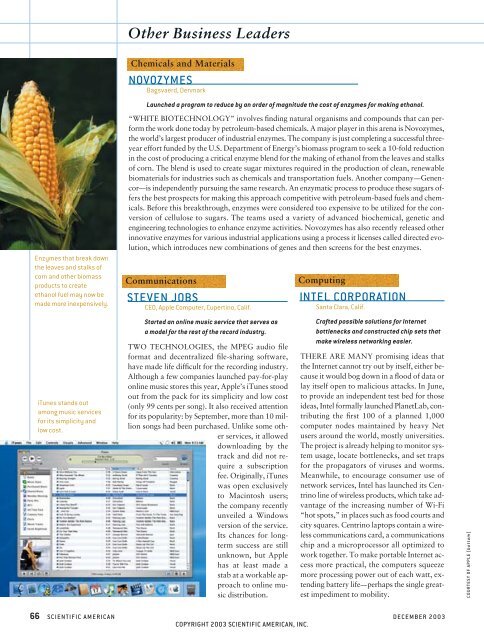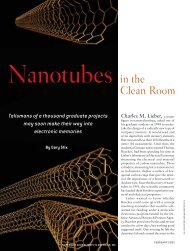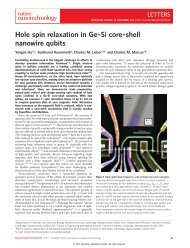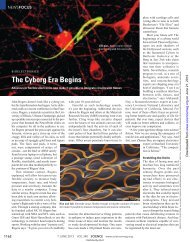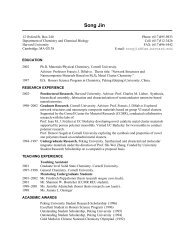download pdf - Lieber Research Group - Harvard University
download pdf - Lieber Research Group - Harvard University
download pdf - Lieber Research Group - Harvard University
You also want an ePaper? Increase the reach of your titles
YUMPU automatically turns print PDFs into web optimized ePapers that Google loves.
Other Business Leaders<br />
Enzymes that break down<br />
the leaves and stalks of<br />
corn and other biomass<br />
products to create<br />
ethanol fuel may now be<br />
made more inexpensively.<br />
iTunes stands out<br />
among music services<br />
for its simplicity and<br />
low cost.<br />
Chemicals and Materials<br />
NOVOZYMES<br />
Bagsvaerd, Denmark<br />
Launched a program to reduce by an order of magnitude the cost of enzymes for making ethanol.<br />
“WHITE BIOTECHNOLOGY” involves finding natural organisms and compounds that can perform<br />
the work done today by petroleum-based chemicals. A major player in this arena is Novozymes,<br />
the world’s largest producer of industrial enzymes. The company is just completing a successful threeyear<br />
effort funded by the U.S. Department of Energy’s biomass program to seek a 10-fold reduction<br />
in the cost of producing a critical enzyme blend for the making of ethanol from the leaves and stalks<br />
of corn. The blend is used to create sugar mixtures required in the production of clean, renewable<br />
biomaterials for industries such as chemicals and transportation fuels. Another company—Genencor—is<br />
independently pursuing the same research. An enzymatic process to produce these sugars offers<br />
the best prospects for making this approach competitive with petroleum-based fuels and chemicals.<br />
Before this breakthrough, enzymes were considered too expensive to be utilized for the conversion<br />
of cellulose to sugars. The teams used a variety of advanced biochemical, genetic and<br />
engineering technologies to enhance enzyme activities. Novozymes has also recently released other<br />
innovative enzymes for various industrial applications using a process it licenses called directed evolution,<br />
which introduces new combinations of genes and then screens for the best enzymes.<br />
Communications<br />
STEVEN JOBS<br />
CEO, Apple Computer, Cupertino, Calif.<br />
Started an online music service that serves as<br />
a model for the rest of the record industry.<br />
TWO TECHNOLOGIES, the MPEG audio file<br />
format and decentralized file-sharing software,<br />
have made life difficult for the recording industry.<br />
Although a few companies launched pay-for-play<br />
online music stores this year, Apple’s iTunes stood<br />
out from the pack for its simplicity and low cost<br />
(only 99 cents per song). It also received attention<br />
for its popularity: by September, more than 10 million<br />
songs had been purchased. Unlike some other<br />
services, it allowed<br />
<strong>download</strong>ing by the<br />
track and did not require<br />
a subscription<br />
fee. Originally, iTunes<br />
was open exclusively<br />
to Macintosh users;<br />
the company recently<br />
unveiled a Windows<br />
version of the service.<br />
Its chances for longterm<br />
success are still<br />
unknown, but Apple<br />
has at least made a<br />
stab at a workable approach<br />
to online music<br />
distribution.<br />
Computing<br />
INTEL CORPORATION<br />
Santa Clara, Calif.<br />
Crafted possible solutions for Internet<br />
bottlenecks and constructed chip sets that<br />
make wireless networking easier.<br />
THERE ARE MANY promising ideas that<br />
the Internet cannot try out by itself, either because<br />
it would bog down in a flood of data or<br />
lay itself open to malicious attacks. In June,<br />
to provide an independent test bed for those<br />
ideas, Intel formally launched PlanetLab, contributing<br />
the first 100 of a planned 1,000<br />
computer nodes maintained by heavy Net<br />
users around the world, mostly universities.<br />
The project is already helping to monitor system<br />
usage, locate bottlenecks, and set traps<br />
for the propagators of viruses and worms.<br />
Meanwhile, to encourage consumer use of<br />
network services, Intel has launched its Centrino<br />
line of wireless products, which take advantage<br />
of the increasing number of Wi-Fi<br />
“hot spots,” in places such as food courts and<br />
city squares. Centrino laptops contain a wireless<br />
communications card, a communications<br />
chip and a microprocessor all optimized to<br />
work together. To make portable Internet access<br />
more practical, the computers squeeze<br />
more processing power out of each watt, extending<br />
battery life—perhaps the single greatest<br />
impediment to mobility.<br />
COURTESY OF APPLE (bottom)<br />
66 SCIENTIFIC AMERICAN DECEMBER 2003<br />
COPYRIGHT 2003 SCIENTIFIC AMERICAN, INC.


